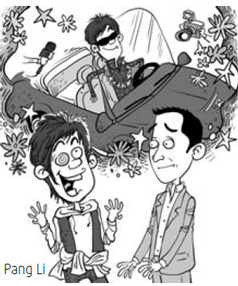Stars in their eyes, but fate is the hand that guides
By Xiao Hao ( China Daily ) Updated: 2009-07-23 15:39:55

One night, I introduced Kai, a young friend who is graduating from the Central Drama Academy, to a famous Taiwanese singer I know. Kai has studied music all his life. He plays piano and saxophone and writes his own music. He also has a handsome face that rivals the top stars in China. In a nutshell, he has star potential, as a visiting Broadway producer once commented.
However, there is no guarantee that he will ever realize his potential. His parents are retired workers from a State-owned factory. They have no connections or money to help him get ahead in the crushingly competitive show business. So, I act as his big brother and do my best to introduce him to people who could help him.
There were six of us at the dinner table. The Taiwanese singer counseled Kai to be patient and always work hard. The two young stars his company had just signed, he said, never practiced enough and forgot lyrics in performances.
"They always say it's cha bu duo, good enough," the singer said, shaking his head in disbelief. "I have my songs on my iPod so I can practice whenever I have time."
That prompted a discussion of how the generation born in the 1980s differed from earlier ones. Even Kai agreed that his generation had too many things readily fed to them, and thus tend to expect things to come easily. The singer's agent mentioned a few more pop stars whose contracts got bought out by bigger companies for huge sums once they became stars.
"They think once they are famous, they've made it and things will play out nicely forever," lamented the singer. "They don't realize a career in show biz is a life-long career. You have to continue to work hard to stay in the game."
I glanced at Kai - who seemed to be drifting into his own thoughts - and I worried that a veteran's life lessons were simply flying over his head. Kai has had an easy life - parents' love and care, talent discovered young, and a smooth path in China's education system all the way to the Drama Academy.
He cherishes the same dreams as his peers - get signed by a big talent agency, star in a hit TV show and instantly become famous and rich. Even with his meager income from appearing in TV commercials, Kai and his girlfriend wear expensive Western brands and shop without ever checking the price tags. Their goals are to lead yuppie lifestyles as soon as possible.
Is this a common trait for the post-80s generation? I wondered. Quickly I checked my urge to disparage the younger generation. I know some young staff of mine, from both rich and poor families, who are willing to work hard to learn. Even if, statistically, more of the younger generation expect too much in life, aren't they also more certain of what they want for themselves, rather than what others expect them to want? Every generation comes with its advantages and baggage.
"I realized a few years ago," the singer's comment brought me back to the conversation, "that character indeed determines fate."
Everyone nodded in agreement, except for Kai, who is probably too young to comprehend the concept of fate. I realized that I ought to focus my attention not on some grand generalization of the generations, but on my young friend. Yet I also realized that no matter how we counsel him, there is this thing called character, shaped by this mysterious thing called life, that would lead to fate that we tend to only see clearly after so much in life has passed us by. So I silently prayed, for life to shape the character of Kai and his generation fast, so they can go far in life.
|
|
|
|
|
|
|
|


























 Raymond Zhou:
Raymond Zhou: Pauline D Loh:
Pauline D Loh: Hot Pot
Hot Pot Eco China
Eco China China Dream
China Dream China Face
China Face






